Discovering the Treasures at the Society of Genealogists
The past few months have been an interesting time for genealogy. New approaches and developing technology have changed the way we do things while we cannot meet up or visit archives. As a trustee and volunteer for the Society of Genealogists (SoG), I have been involved in supporting some of these developments and have been pleased with how adaptable organisations have become.
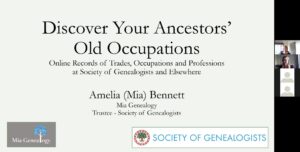
Online talk for SofG. © Image shared with permission of Society of Genealogists
One of our big advances is the start of Online Talks. Opening up the learning opportunities (that are normally limited to a group of about 30 in our London library) to a larger international audience has been fun. I have given talks on ‘Occupational Sources Online at SoG and wider’ and ‘DNA for Beginners’. We have staggered the timing of talks to cover both morning and afternoon slots so international audiences (including Australia) can take advantage. There is an ever-expanding list of upcoming online talks. One of my favourite parts is the relaxed conversations we have, as people arrive for the talk and in the Q&A session at the end.
To share the talks with a wider community, the SoG are recording many of them and they are soon to be added for sale via the SoG website using Vimeo. Another source of learning is with the education modules available within the Member’s Area. Else Churchill, the SoG’s genealogist, has recorded tutorials on Rural Ancestors and Women Ancestors, which are available to members for free. Under Members Tutorials, there are a range of topics including ‘School to Job’ covering education and occupation records.
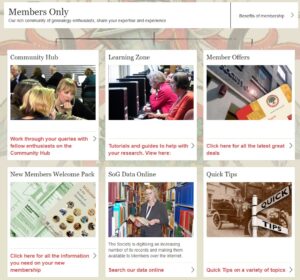
Glimpse of the members’ area. © Image shared with permission of Society of Genealogists
If you watch these tutorials, you can then hop onto the Community Hub and discuss the tutorial with others who have also watched it. Within the Community Hub, there is a chance to ask any genealogical question and have access to the wide knowledge of the SoG community including its experienced volunteers. Following the demise of the RootsWeb mailing list, the hub has taken off and is now a hive of activity. For anyone new to British research, there is also a Beginner’s Course with 10 modules you can carry out in your own time.
The volunteer community at SoG have adapted to the lockdown, moving from onsite projects to doing at-home transcriptions. Our Pedigree Roll project has been so popular that all the rolls digitised before lockdown have been indexed and entered onto a family tree database. Now to get volunteers safely back into the building to get the next set of rolls digitised (not long now). One of the projects that has had extra attention during lockdown is to add indexes to some of the records that are on SoG Data Online only as images. This will continue to improve the accessibility of the online records at the SoG. Keep an eye on the SoG monthly newsletter (sign up at the bottom of the home page) for details as new data and indexes are released.
There are already many treasures within the Society of Genealogists Data Online. The data online collections are a variety of indexes, transcripts, books and images. There are a wide range of record types covering parish registers, BMD certificates, memorial inscriptions, occupation records, probate, marriage licences, poll books and a whole host more. Finding items can sometimes be challenging and this is something that we are looking at improving as we proceed with our transformation programme. As with all treasures, it is worth taking the time to find them.
There are different ways to search the datasets. As part of the Occupations talk, I put together a handout with instructions.

SoG Online Data Categories. © Image shared with permission of Society of Genealogists
To really understand the breadth of datasets, it is worth looking at the full listing and using the ‘Browse’ function. Under ‘Browse’, you can see all the categories of records then drill down into more details and then down to individual records. The full listing is provided in pdf format or a live listing.
A number of the datasets are particularly interesting. One of my favourites is the Civil Service Evidence of Age, which is also available via Findmypast. This collection was given to the SoG by the Civil Service Commission. It contains documents to support the age of the candidates for the Civil Service examinations between 1855 and 1939. The candidates could enter the Civil Service at any age and hence there is a wide range of birth dates covered within the proof of age.
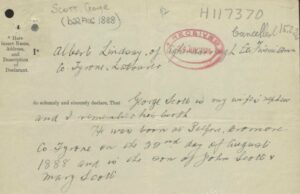
Example of notarised declaration in Civil Service Evidence of Age. © Image shared with permission of Society of Genealogists
In many cases, the candidate was born before civil registration (1837 in England and Wales, 1855 in Scotland and 1864 in Ireland). Proof of age where a civil birth record was not available could take the form of a baptismal record, alternative records that recorded their date of birth, or a notarised declaration by the parents or someone else who knew the candidate.
The Civil Service requirements also applied to anyone taking up a post internationally and hence born outside of the British Isles. In particular, candidates born in India, Malta and USA are well represented. As a result the collection holds a wealth of information including often the only evidence that remains for a person’s birth date and location. This is a copy of a declaration of a birth made by the candidate’s uncle and providing useful familial relationships.
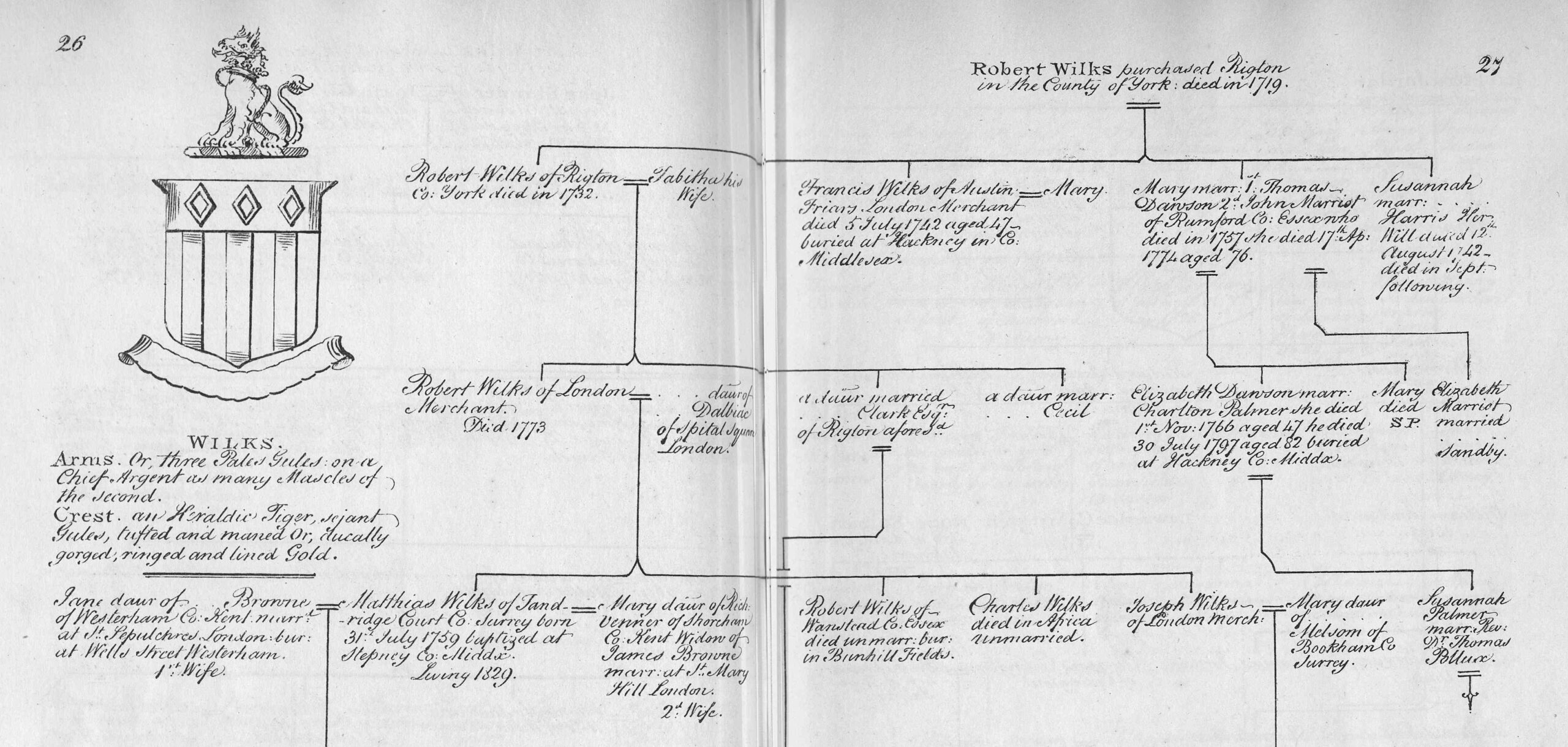
Surrey pedigrees example. © Image shared with permission of Society of Genealogists
If you have more well-to-do ancestors from Surrey, there is a fascinating book called ‘Pedigrees of Surrey families 1837’, containing hand drawn pedigrees full of genealogical information. Fun even to just look at the neat presentation of these pedigrees (which mainly cover the 18th century families).
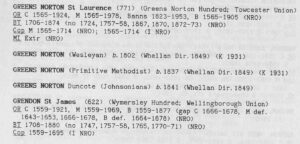
National Index of Parish Registers Northampton example. © Image shared with permission of Society of Genealogists
For those who have been researching the English parishes for a while, you may be aware of the National Index of Parish Registers book series that captures the location and coverage for parish records within England. As well as Church of England, it covers non-conformist places of worship. It also covers court church records for the county such as Marriage Licence Bonds and Administrations. These books have all been digitised and are available under the ‘Text Book’ category under ‘Browse’.
The christenings at the Portuguese Embassy Chapel in London from 1663-1844 are indexed under ‘Parish Registers – Middlesex registers’. These include the parents’ names and often the mother’s maiden name plus the sponsors. This is the only place I have located the mother’s surname for a branch of my family with a big brickwall. The majority of these were for Catholic families. I do not believe they are available anywhere else online however the corresponding marriages for the Portuguese Chapel are available at https://issuu.com/tcrs/docs/volume38.
Finally, there is a collection of probate records under ‘Wills’ including abstracts and indexes of wills from Devon and Somerset and Ireland where the copies held by record offices have been lost to fire. In some cases, this is the only location that the abstract has survived.
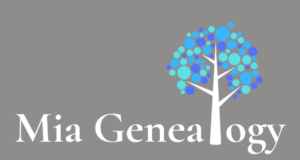 In addition to supporting the SoG during lockdown, I have been enjoying the company of lots of Australian genealogists thanks to Talking Family History each Friday (now fortnightly). If you haven’t joined in, then check it out and I am there most fortnights if you have any further questions or just want to say hi. I am also hoping to meet many more of you in 2022 when I head to Queensland for Family History Down Under.
In addition to supporting the SoG during lockdown, I have been enjoying the company of lots of Australian genealogists thanks to Talking Family History each Friday (now fortnightly). If you haven’t joined in, then check it out and I am there most fortnights if you have any further questions or just want to say hi. I am also hoping to meet many more of you in 2022 when I head to Queensland for Family History Down Under.
Amelia (Mia) Bennett www.miagenealogy.com
Footnote: All images shared with permission of Society of Genealogists.
Editors postscript: Several GSQ members met Mia who presented four informative talks on the Unlock the Past Mediterranean cruise of 2019. Similarly, the UTP Tasmanian cruise featured many great talks by Else Churchill.

Thanks for a great blog Mia. I attended one of the SoG’s Open Days when I was in London for RootsTech London 2019 and the tour that Else did was so informative and comprehensive I joined and returned for a few more visits. It’s amazing how many unusual records you are lucky enough to have in your collections.
Pingback:Guest Posts by Amelia - Family Research - Genealogy